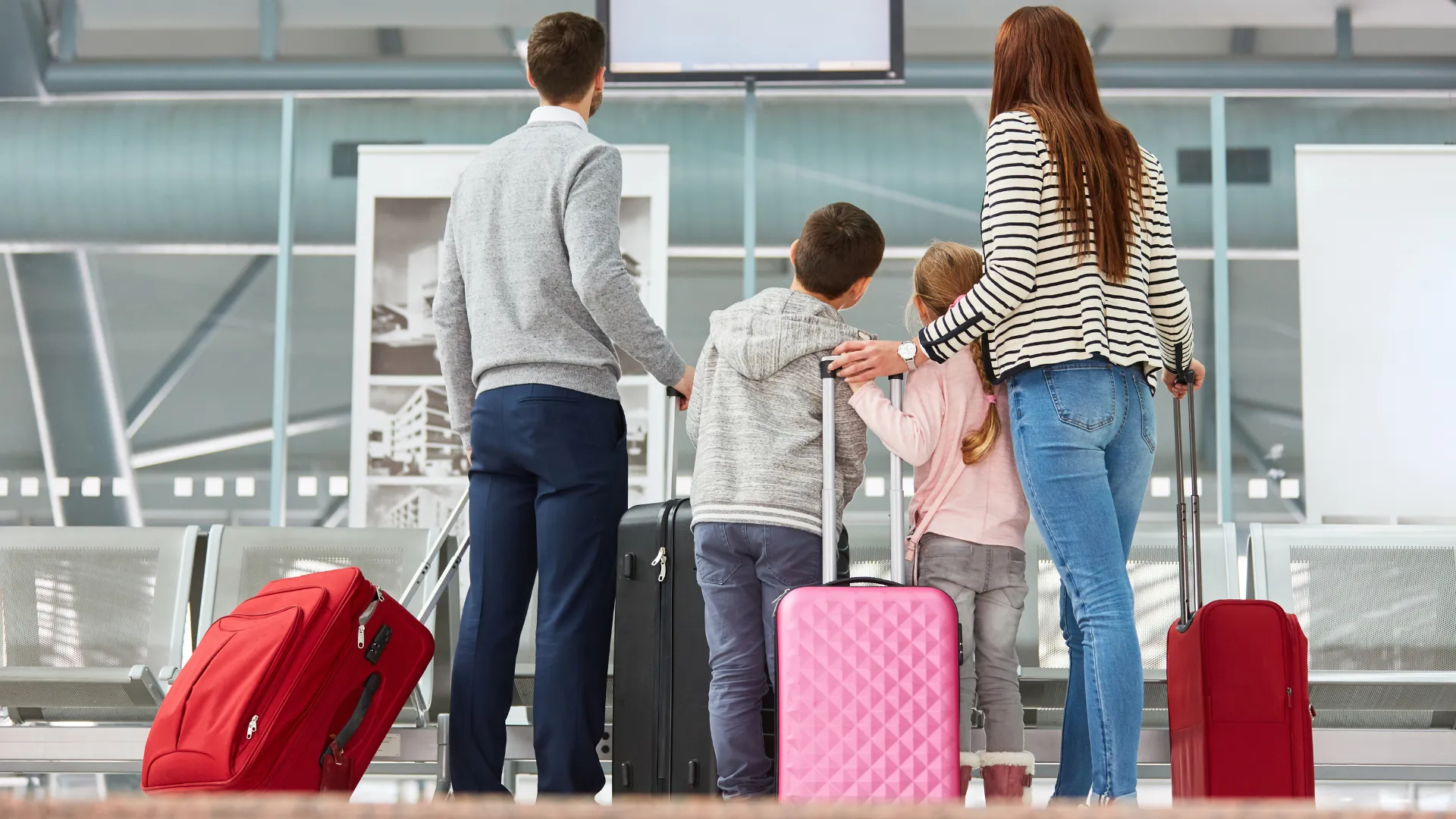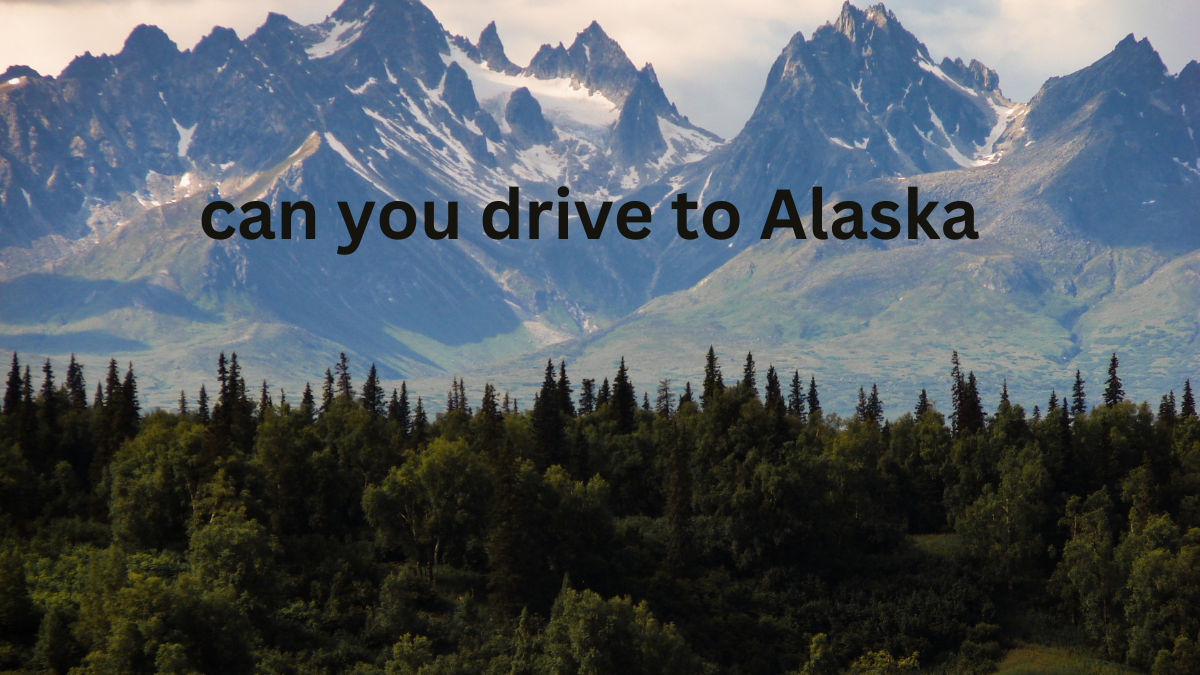Table of Contents
What Barriers Prevent Relocation Overview?
Relocation can happen for many reasons. It might be due to economic issues, political unrest, or wanting a better life. However, moving is often complicated and comes with many challenges. The idea of starting fresh in a new country is promising. But, many face obstacles that block their move.
Barriers can be economic, social, legal, environmental, psychological, or practical. They greatly affect the choices of migrants and refugees. High housing costs and limited jobs often make relocation too expensive.
Social barriers like language differences and cultural adjustment can make people feel isolated. This can hinder their ability to adapt to their new surroundings. Immigration policies and refugee status create bureaucratic hurdles. They delay or prevent relocation.
Natural disasters or border restrictions can block entry into a new country. Psychological factors, like fear of the unknown, can also discourage individuals from moving.
These barriers raise the question of what barriers prevent relocation, as they form a complex web of challenges. Also, it’s vital to know what stops relocation. This is key for migrants, policymakers, and organizations helping with relocation efforts.
To address these obstacles, we must identify the barriers to relocation and how to reduce them.
Introduction to Relocation Barriers and Type Of Barriers Prevent Relocation
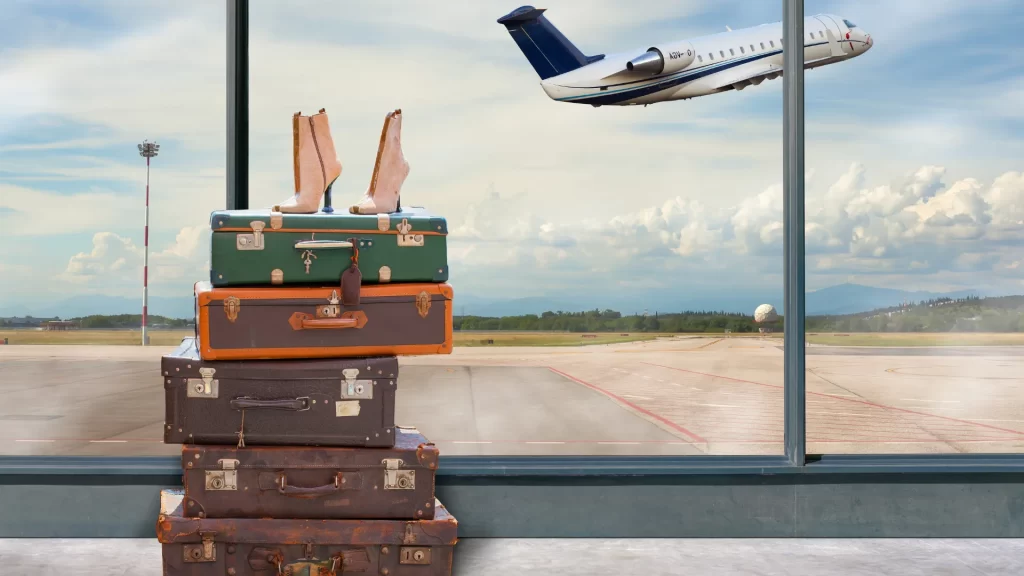
Relocation is a life-changing choice. It can bring many opportunities, like better jobs and living conditions. Many barriers prevent people from relocating. These include seeking refuge in a new country, relocating for work, or escaping difficult situations.
These barriers can be economic, social, legal, psychological, environmental, and practical. Understanding these obstacles is essential for anyone considering a move abroad.
This article will explore the key barriers to relocation. It will cover economic challenges, like job opportunities and housing costs. It will also address social and cultural factors, such as language and adapting to the community.
It will also discuss the legal and political limits. It will cover the geographical and psychological challenges of relocating. When thinking of relocating, ask what barriers might hinder success. These factors can greatly affect the decision-making process.
Finding barriers to relocation helps individuals and policymakers. It shows them how to better tackle these challenges. Lastly, we must identify barriers to relocation. This is vital to create solutions that help people overcome these obstacles and achieve their relocation goals.
Also Read: Curious if You Can Drive to Alaska? Here’s the truth!
Economic Barriers
Job Opportunities and Economic Migration
One of the primary barriers to relocation is the lack of job opportunities. Many migrate to improve their lives. They seek better jobs or want to escape economic instability.
Economic migrants seek better financial conditions. They often struggle to find jobs in their new country. Without the right skills or knowledge, finding a job can be tough. This is especially true in foreign countries with language barriers and unfamiliar job systems.
It is crucial to know what hinders relocation, like few job opportunities. This is vital for those considering moving to a new country. Also, consider the barriers to relocating. These are finding work and ensuring long-term stability in the new place.
Access to Work Permits and Financial Support
Access to work permits, visas, and financial support is crucial for anyone planning to relocate. Many migrants struggle to get the documents to live and work legally in their destination country.
For refugees, the process is more complicated. They may have limited access to work permits. This makes it harder for them to be self-sufficient. Also, aid from agencies or relatives may not always be available. This could complicate the relocation process.
We must know what barriers prevent relocation, as these legal and financial challenges can significantly impact the ability to move and settle in a new country. Identifying what barriers prevent relocation is key to helping migrants and refugees overcome these obstacles and achieve their goals.
Social and Cultural Barriers
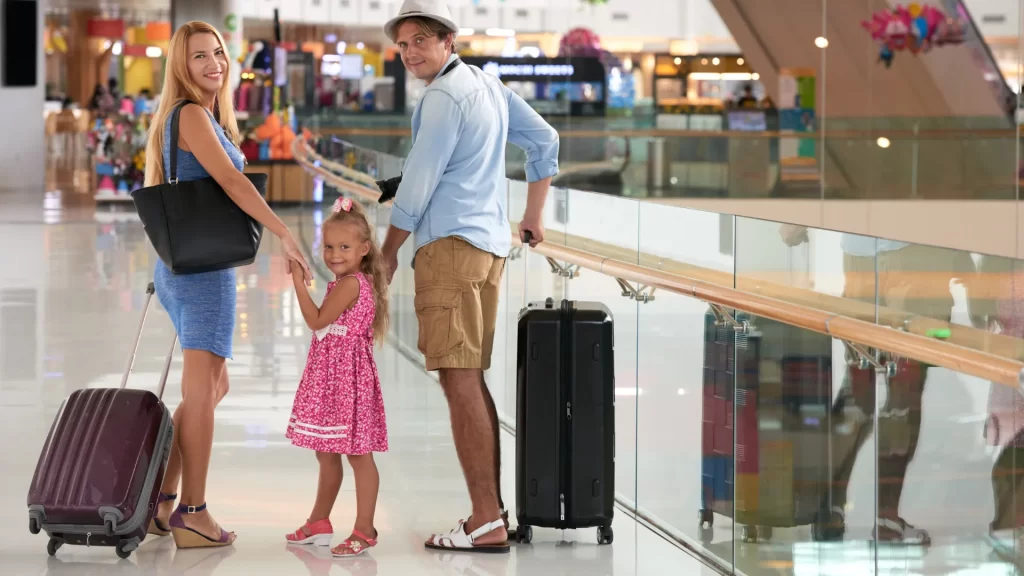
Overcoming Language Barriers in Relocation
Language barriers are one of the most significant social challenges people face when relocating. Migrants to a new country must often learn a new language. They need it to communicate, find work, and integrate into the community.
Without fluency in the local language, individuals may struggle. They may not understand daily conversations, job expectations, or basic services. Learning the language can be tough for refugees or asylum seekers.
They often lack the time and resources to do so before moving. Understanding what barriers prevent relocation, such as language difficulties, is key to helping migrants overcome these challenges and integrate successfully into their new environment.
Adapting to a New Culture and Community
Adapting to a new culture is another obstacle that migrants face. Cultural differences can affect how people relate to others. They can also impact work in a professional setting and social navigation. For those moving abroad or seeking asylum, adjusting to a new environment can be overwhelming.
The new community, traditions, food, and lifestyle can feel like an entirely different world. Migrants may feel isolated or shocked by new cultures.
This is common if their customs or norms differ. Understanding what barriers prevent relocation, such as cultural differences or feelings of isolation, is important for helping migrants adjust and integrate into their new environments.
Also Read: How Long Does It Take to Climb Mount Everest? Ultimate Guide
Legal and Political Barriers
Immigration Policies and Legal Challenges
Immigration policies are one of the biggest barriers to relocation. Many countries have strict, complex laws on who can enter and live there.
They are often hard to navigate. Migrants may face long waits and red tape. They need proper documents to relocate. Asylum seekers face tough legal challenges in proving their status and securing the right to stay in a foreign country.
Fear of Persecution and Refugee Status
For refugees and asylum seekers, the fear of persecution is a significant driver of migration. However, getting refugee status is often long and complicated. Many refugees must live in precarious conditions until their cases are resolved.
The fear of being returned to a country where they face danger is a constant concern for these individuals. Also, political factors may affect their ability to relocate or seek refuge in another country.
Environmental and Geographical Barriers
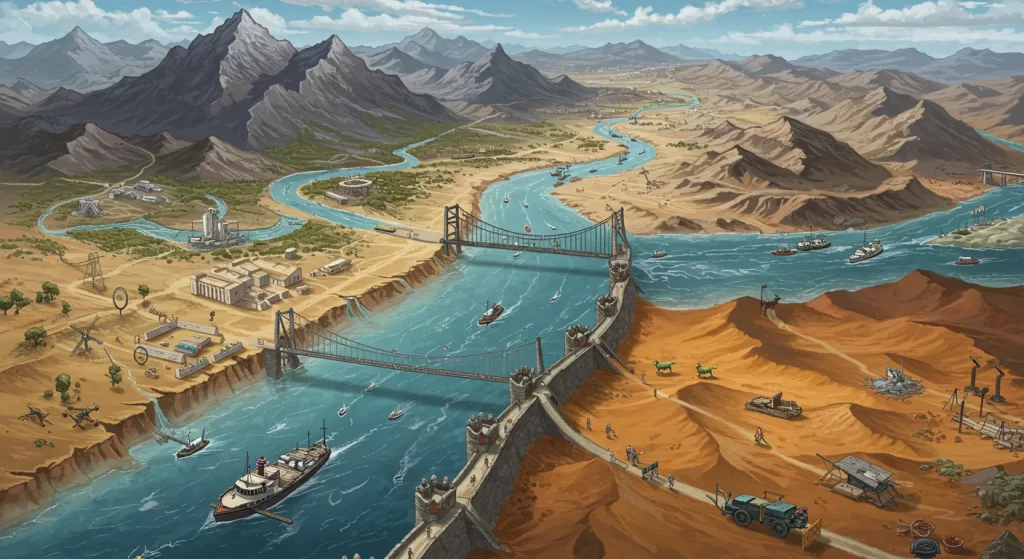
Natural Disasters and Geographic Barriers to Movement
Geographical barriers like mountains, rivers, and oceans can complicate relocation. This is especially true for people in countries with poor infrastructure, or those facing natural disasters. Natural disasters like earthquakes, floods, and hurricanes can destroy homes and infrastructure.
They can ruin livelihoods, too. This can make relocation necessary or impossible. For those fleeing conflict zones, crossing borders may be dangerous or blocked. This complicates their journey to safety. Understanding what barriers prevent relocation, such as natural disasters or dangerous borders, is vital for those trying to escape difficult circumstances.
Identifying what barriers prevent relocation, like geographical obstacles, can help develop solutions to aid migrants in overcoming these challenges.
Challenges of Crossing Borders and Refugee Movement
A key challenge for migrants, especially refugees, is crossing borders. They flee war and political unrest. War, unstable politics, and border restrictions can block safe passage. Refugees often face violence and exploitation when crossing borders.
This is especially true if they are fleeing the Syrian crisis or other violent conflicts. This geographical barrier is compounded by the lack of resources, shelters, or food along their journey.
Also Read: Madurai Tanjore Tour Package: Temples, Trichy & Rameswaram
Psychological Barriers
Psychological Challenges in Moving Abroad
The uncertainty and fear of the unknown can take a psychological toll on migrants. For those leaving their home countries, moving can be stressful. Migrants may struggle with feelings of homesickness, anxiety, and isolation as they adjust to a new environment.
The fear of failure, of not being able to secure a job or adapt to a new culture, can also contribute to the psychological challenges of relocation. Understanding what barriers prevent relocation, such as psychological factors like anxiety or fear of failure, is crucial to helping migrants overcome these emotional obstacles.
Fear of the Unknown and Adapting to New Environments
Migrants deal with emotional stress from leaving family, friends, and familiar places. They also fear adjusting to a completely new environment.
The unknown future, along with job hunting and settling in a new place, can cause great stress. For refugees, the fear of persecution or being sent back to their home country can make the relocation process even more traumatic.
Practical Barriers to Relocation
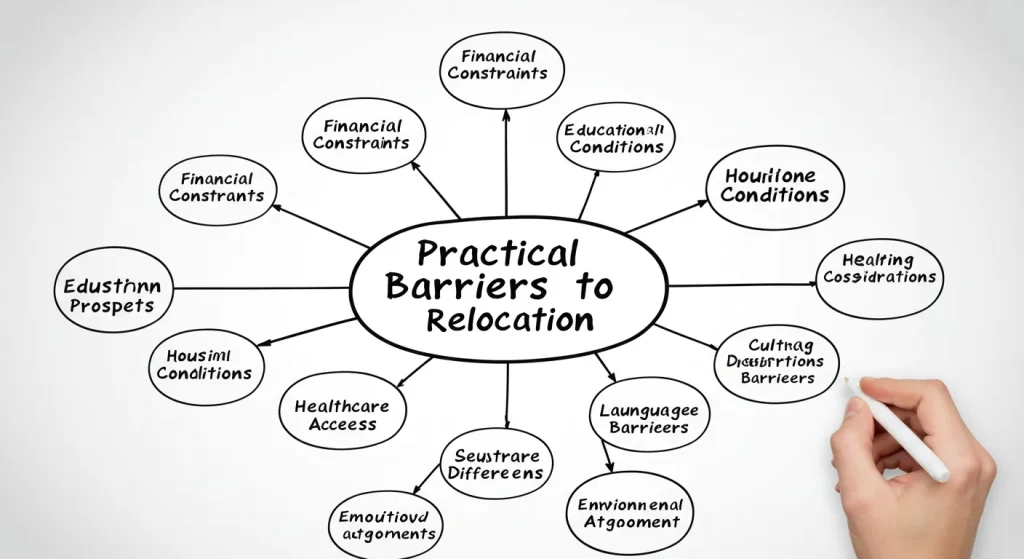
Lack of Resources: Shelter, Food, and Medicine
A lack of resources, such as shelter, food, and medical care, can prevent successful relocation. Migrants, particularly refugees, may not have access to adequate resources to support themselves in a new country. Without aid agencies or a strong financial network, many can’t cover basic living costs. This lack of resources can make relocation unfeasible or unsustainable in the long term.
Difficulty Finding Housing and Employment Opportunities
Finding suitable housing and employment is a critical practical barrier for many migrants. Without a stable job, many migrants cannot afford rent, which makes it challenging to secure permanent housing. Also, without a visa or work permit, finding a job may be tough.
In countries with high unemployment or strict immigration policies, relocating can seem impossible. We must understand what barriers prevent relocation, as these challenges can create significant obstacles for migrants.
High housing costs and a tough job market can block migrants from moving. We must identify what barriers prevent relocation for work and housing, as addressing these is key to solving the root causes of migration challenges.
Limited Access to Education and Healthcare Services
For many people, access to education and healthcare is a vital factor when considering relocation. In some cases, migrants may not have access to affordable or quality education, which can affect their long-term prospects. Similarly, healthcare services may not be accessible or affordable, especially for refugees or migrants without proper health insurance.
These practical barriers can significantly impact the decision to relocate or the quality of life in the destination country. Understanding what barriers prevent relocation, such as the lack of access to education or healthcare, is crucial for ensuring a successful transition to a new life.

